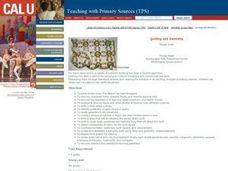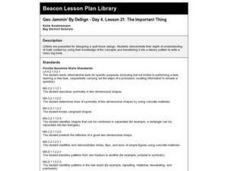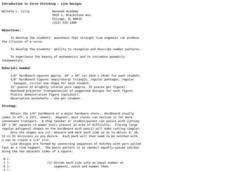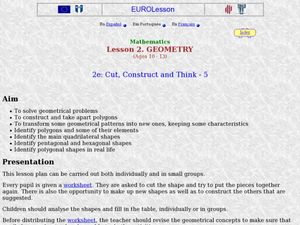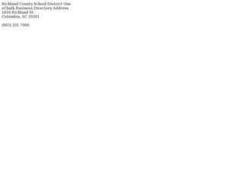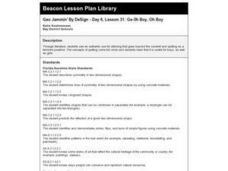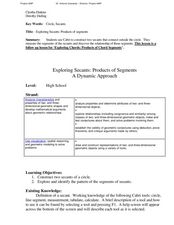Curated OER
Sew, You Want To Quilt?
Students become familiar with the achievements of the artist Faith Ringgold. They take notice of the patterns in their environment. They connect the mathematical concept of patterns to create a class quilt.
Curated OER
The "Art" of Baseball
Students investigate the art of baseball. In this sports lesson plan, students discuss their thoughts about the sport of baseball and create a baseball word list. Students use pattern blocks and drawing paper to create a simulated...
Curated OER
Egg-streme Tesselation
Sixth graders view a video of tessellating an egg shape. They focus upon the problem solving strategies used and how tessellation geometry was used to construct the three dimensional figure. They create their own tiling patterns.
Curated OER
Geometry and Quilting
Students create a quilt square for a class quilt using at least three, two-dimensional geometric figures. They research and write a brief description of at least two different quilt patterns that they find. Pupils discuss that quilts are...
Curated OER
Math is Beautiful: Tessellation
Learners examine patterning in Chinese and Japanese artwork prior to creating their
own tessellations using styrofoam plates in this creative cross-curricular lesson for upper-elementary/middle level classrooms.
Curated OER
Geo Jammin By Design: The Important Thing
Students brainstorm what they know about geometric terms and patterns. They identify symmetry, shapes and congruency. They create a book of symmetry.
Curated OER
Geo Jammin' By DeSign - Day 5, Lesson 24: Read All About It!
Students listen to The Important Thing About Quilt Design and rewrite an original version using geometric terms.
Curated OER
Geometric Figures
Students identify two and three dimensional shapes and use appropriate geometric vocabulary to write a description of the figure by taking pictures of geometric figures in their own environment.
Curated OER
How many edges do I need to cut in order to open a cube?
Students problem solve to open a cube to create different shapes. In this problem solving lesson plan, students are given a cube and the shapes to open it up to, and they have to cut the cube open to make certain shapes. This gives them...
Curated OER
Grade 5: Testing for Tessellations
Fifth graders use formal geometric language to describe polygons (and other shapes) that will tessellate the plane and those that will not. Students make generalizations about the characteristics of a polygon (or other shape) that will...
Curated OER
Tangram Puzzles
Learners explore the origin of tangram. In this algebra lesson, students form different shapes and figures using tangram. They solve for the area of different shapes without using any geometric formulas, but the idea of tangram being put...
Curated OER
Introduction to Curve Stitching - Line Designs
Students develop their awareness that straight line segments can produce the illusion of a curve and helps them recognize and describe number patterns and geometric fundamentals.
Curated OER
Volume and Surface Area: Which Is More?
Students explore the volume and surface area of three dimensional figures. Through the use of video, students discover three dimensional shapes, their uses in real-life applications, and methods used to calculate their volume and surface...
Curated OER
Geometry: Cut, Construct, Think
Students identify the properties of polygons. In this geometry lesson, students cut out shapes try to construct polygons. Students analyze the shapes and fill out a table of characteristics.
Curated OER
Keeping Warm with Fractions
Fourth graders study quilts and related activities to illustrate geometry, basic fractions, and patterning skills. They choose a precut piece of pre-cut color/shape construction paper to discuss the pattern, color, shapes, sizes,...
Curated OER
Tessellations
Students identify and construct figures that tessellate. They investigate which regular polygons tessellate and how to modify them to make other tessellating figures. Students explore how naturally occurring tessellations have been...
Curated OER
A World of Symmetry
Students identify lines of symmetry. In this symmetry instructional activity, students create objects and identify their lines of symmetry. They answer questions about lines of symmetry. Students cut shapes out of cookie dough and...
Curated OER
A Polynomial Quilt
Tenth graders create polynomial quilts. In this polynomials lesson, 10th graders use concrete models, such as construction paper, to create various shapes described. Students use the FOIL method to multiply terms and to get a square...
Curated OER
Geometry and Tony Smith Sculpture
Students respond to Tony Smith's sculpture as art and brainstorm about math concepts inherent in his work. They create a sculpture with polyhedra nets, calculate the cost of covering sculpture in gold, and write an exhibit label for...
Curated OER
Symmetry in Paper Airplanes
Students explore symmetry. For this geometry and scientific inquiry lesson, students design paper airplanes with middle line symmetry, as well as right, obtuse, and acute angles. Students measure the plane's angles using a protractor,...
Curated OER
Ge-Oh Boy, Oh Boy
Young scholars listen to the book, Sam Johnson and the Blue Ribbon Quilt and discuss the art of quilting. They examine various symmetrical sewing designs, and identify reflection pieces, slides, and flips.
Curated OER
Exploring Secants: Products of Segments
Young scholars explore secants and circles. In this geometry lesson, students identify the properties of two and three dimensional shapes. They create arguments to prove the theorems are true.
Curated OER
Exploring Properties of Rectangular Prisms
Learners explore the properties of rectangular prisms. In this geometry instructional activity, students identify properties of two and three dimensional shapes. They use Cabri technology to create polygons and solve problems.
Curated OER
Geometry Scavenger Hunt
Learners use the digital camera, identify geometric shapes (in nature as well as man-made), and gain a better understanding of geometric vocabulary. They search for and recognize geometric shapes in unusual settings





